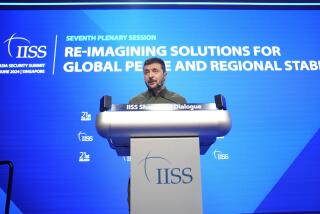Yeltsin Cuts Trip Short After Forging New Ties to China
BEIJING — Russian President Boris N. Yeltsin hurried back to Moscow today to deal with a brewing Cabinet crisis, cutting short a visit to China that forged a powerful new friendship between the two nations.
In the first sign of disputes between Yeltsin, who favors radical economic reform, and his new prime minister, the more conservative Viktor S. Chernomyrdin, the Russian president said that “fighting” had begun over Cabinet posts and Chernomyrdin was trying to remove too many young reformist ministers.
“So the boss must return and restore order there,” he said.
A presidential spokesman assured reporters that “nothing extraordinary has happened” but said the president had decided to forgo a planned visit to Shenzhen, the special economic zone in southern China, because he was needed at home and had already fulfilled all the goals of his visit to China.
On Friday, Russia and China signed 24 agreements ranging from pledges of mutual troop reductions to joint nuclear energy projects and expanded economic ties meant to generate billions of dollars in trade.
“For the former Soviet Union, China was a potential enemy,” Yeltsin said. “But today, for Russia, it is no longer a potential enemy.”
Yeltsin said Russia and China were succeeding so well at improving their relations that other world powers, particularly the United States and Japan, could fear that a threatening, 1950s-style Sino-Soviet alliance is about to be revived. But they should understand, he said, that warmer ties between Russia and China do not threaten the rest of the world.
“They could react jealously, but there can be no basis for that,” Yeltsin said. “We have equal cooperation. And I think here the United States and Japan will understand” that Russia and China are only seeking to further their own national interests.
Yeltsin, the man who delivered the death blow to Soviet communism, and the staunchly Communist Chinese leadership pointedly avoided the ideological questions that led to the poisonous Sino-Soviet rift of the 1960s and 1970s.
Instead, Russian officials emphasized the tremendous vistas for cooperation across the world’s longest border, and the stabilizing effect a Sino-Russian alliance could have in the region, as dual guarantors of peace.
“This is a major new stage in world politics that will influence the 21st Century, as well,” Vyacheslav Kostikov, Yeltsin’s spokesman, said. “We’re moving toward multipolar politics,” in which Russia cultivates friends wherever it can, rather than concentrating on superpower relations and contacts with Europe.
Chinese officials, although far less forthcoming than their Russian counterparts, expressed unreserved enthusiasm about Yeltsin’s two-day visit. Premier Li Peng promised Yeltsin that “no matter how the situation changes, China will develop longstanding, stable and friendly relations of cooperation with Russia,” Foreign Ministry spokesman Wu Jianmin said.
The two dozen Sino-Russian agreements signed Friday amounted to such an unusually bountiful harvest for such a state visit that Yeltsin said it “should be entered into the Guinness Book (of World Records).”
Yeltsin acknowledged that he was spurred in part by recent political troubles at home to seek an impressive foreign policy success. Asked if his difficulties with conservative lawmakers at the Congress of People’s Deputies had influenced the visit, he replied with a slight snarl: “Yes, there was more spite driving me to do everything faster and for real.”
He said that Russia and China had decided to sign “at the last moment” and at Li’s insistence a memorandum on military cooperation laying out plans to reduce troops on both sides of their 2,750-mile-long border and to create a demilitarized zone there.
The agreement did not mention mounting Russian arms sales to China, including high-technology weapons systems that have Western officials worried about China’s growing arms sophistication. Russian officials maintain that sales of fighter planes and antiaircraft systems do not upset the military balance in the region and say they will continue.
Russia and China also announced a major joint project bringing $2.5 billion worth of Russian expertise and equipment--paid for with Russian credits over about 13 years--into China for construction of a nuclear power plant. China, in turn, pledged credits expected to total about $50 million for Russian imports of food.
Yeltsin, who was rosy, jovial and in unusually fine fettle Friday, said Russian-Chinese trade has such enormous potential that it could eventually outweigh Russian trade with the West. Referring to the ancient trade route stretching from China to Europe, he said, “May the old Silk Road become both for you and for us the road to our prosperity.”
The Russian president was openly impressed with China after two days of meetings and sightseeing. He met Friday morning with Premier Li, then visited the Forbidden City, China’s old imperial palace. He later met with Communist Party leader Jiang Zemin.
He did not meet with Deng Xiaoping, saying he had been told that Deng was “not feeling too well.” Deng, 88, still China’s most senior leader, last appeared in public in October, when he looked frail but was able to walk. No additional information was available as to whether Yeltsin’s comment indicated some further deterioration in Deng’s health.
Yeltsin said that he was convinced after his meetings with Chinese leaders that they intend to begin political reforms, as well. As for Russia’s reforms, he said, they cannot copy the Chinese model, but “we can take some aspects for the enrichment of our own.”
More to Read
Sign up for Essential California
The most important California stories and recommendations in your inbox every morning.
You may occasionally receive promotional content from the Los Angeles Times.










